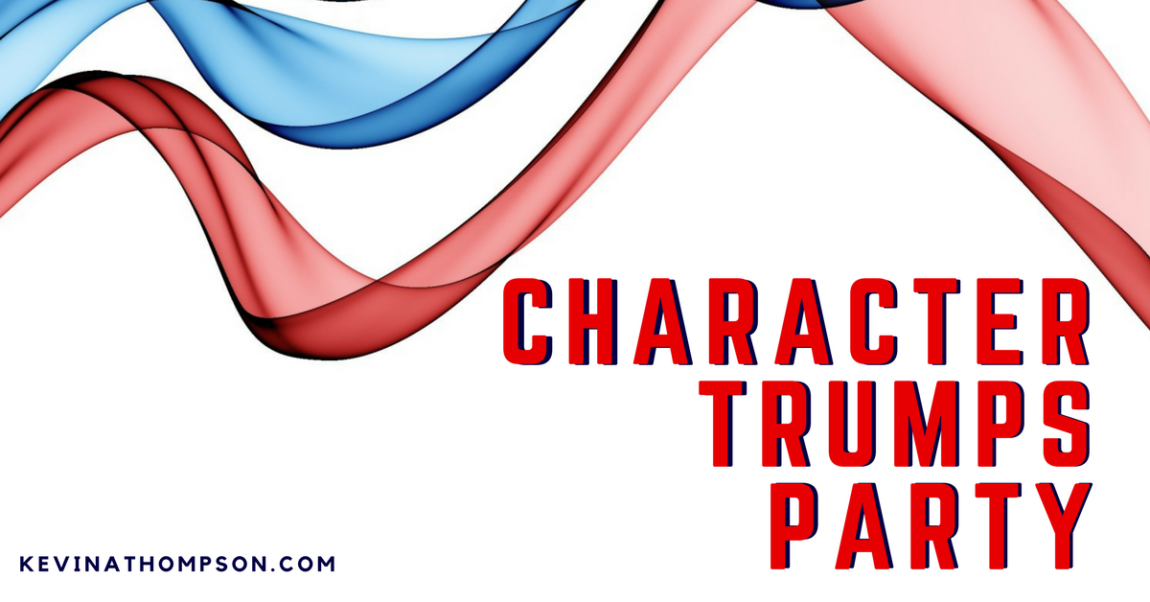Political ideas matter. The differences which exist between (and within) political parties shouldn’t be downplayed. America was created with the idea of robust political debate. Elections have consequences because we do not all think alike. During campaigns, we should verbalize our differences, fight for our beliefs, identify candidates we can support, and attempt to rally others to our beliefs. After elections are over, we should do everything in our power to work with others to find common ground and get work done.
Policies and parties are important, but character is more important.
Having strong moral character should be non-negotiable in leadership. While we should never expect perfection from our politicians, we should carry a high ideal and we should demand a base level of human decency. They should love their spouse, respect their opponents, and treat others with love. Leaders should value the truth, serve those they lead, and sacrifice for the well-being of others.
Of course, leadership includes an element of power. Because of the presence of power and the nature of humanity, we will be fooled. Some will lie, others will scheme, and every leader will not be able to live up to a high standard. However, we should not lower our standards. We should continue to demand strong character from those with whom we entrust leadership. When they fail, we should expect them to admit it, seek forgiveness, and not repeat their mistake. But we should also recognize that some actions disqualify us from leadership.
As a pastor, the expectations to which I’m held is higher than most. Some actions should cost me my job. Other actions should forever prevent me from ever being the senior leader of a church again. Others should prevent me from ever being on a church staff.
While differing professions have different standards, leading communities, states, and nations are important enough that we should have strong standards. National political leaders should be above reproach on key issues. Physical, emotional, or sexual abuse of women or children should forever forbid them from leading. Sexual harassment should disqualify them from politics. An ongoing hidden affair should cost them their current position.
When we fail to hold a simple moral standard, we risk much. It’s fair to discuss what elements define good character and what the exact cost should be for specific violations, but it is not logical to debate the importance of character in leadership. Policies change. Issues evolve. But character can carry a person through a variety of situations. For this reason, character trumps political party or policy.
If I were the President and my party nominated a candidate for major political office who did not fit a base level of human decency and character (Roy Moore), I would go to that state and campaign for the candidate’s opponent. I would do so without reservation in order to make it abundantly clear that character matters. To ignore the candidate, or even worse, to endorse the candidate, is to play a political game. It’s to elevate political party over character.
Sadly, this is a game played by both sides. Proof: how often has one party crucified a political opponent for one action while justifying a political ally for the same activity? It’s a game. It’s politics. We have to stop it.
When I was a kid, I was told character matters. Gary Hart was forced (and rightly so) to withdraw from a Presidential race because he was having an affair and a President was impeached (and rightly so) for lying about his affair. Now a few decades later, those who taught me that character matters are sitting quietly by as a major political party supports a candidate with multiple accusations of misconduct with minors. They applaud the leader of their party who says, “The last thing we need in the Senate” is someone who won’t vote like us. It’s sad. The last thing we need in the Senate is someone who may have abused teenage girls or who has clearly had improper boundaries with young women.
I’m a registered independent. As a pastor, I have to lead people of all political persuasions so I don’t identify with a specific political party. I do my best to irritate people on both sides of the aisle. But privately, I have politicians I like and those who greatly frustrate me. Yet I would crawl to a polling place and vote for someone with whom I have no political agreements if my only choice opposing that candidate was someone who had credible accusations of physical, emotional, or sexual abuse against women or children.
Character trumps party.




15 Responses to Character Trumps Party